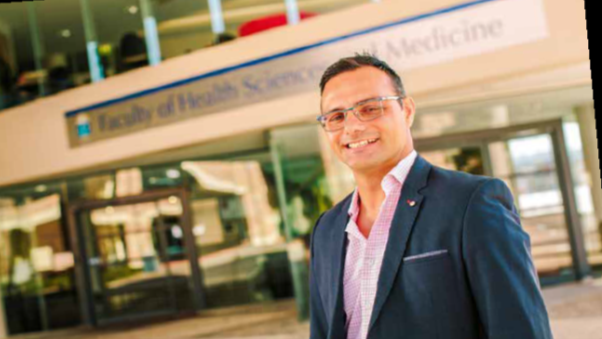 At the beginning of 2015, Associate Professor Shannon Springer was appointed academic lead for Aboriginal and Torres Strait Islander Health at Queensland’s Bond University. His professional background prior to this appointment highlights a notable body of work, including being one of the first two Aboriginal doctors to graduate from Townsville’s James Cook University (JCU), 10 years’ experience working in Aboriginal and Torres Strait Islander health across Queensland, and serving on a variety of boards and grassroots organisations dedicated to improving Aboriginal and Torres Strait Islander health outcomes. He still performs his clinical work at Charleville and Western Areas Aboriginal and Torres Strait Islander Health Service – the Aboriginal Medical Service in Charleville.
At the beginning of 2015, Associate Professor Shannon Springer was appointed academic lead for Aboriginal and Torres Strait Islander Health at Queensland’s Bond University. His professional background prior to this appointment highlights a notable body of work, including being one of the first two Aboriginal doctors to graduate from Townsville’s James Cook University (JCU), 10 years’ experience working in Aboriginal and Torres Strait Islander health across Queensland, and serving on a variety of boards and grassroots organisations dedicated to improving Aboriginal and Torres Strait Islander health outcomes. He still performs his clinical work at Charleville and Western Areas Aboriginal and Torres Strait Islander Health Service – the Aboriginal Medical Service in Charleville.
These impressive credentials make it all the more surprising that Shannon’s original career plan didn’t involve medicine at all. As a teenager growing up in Mackay, study wasn’t necessarily the biggest priority for the nascent Shannon, with his passion directed rather towards rugby league. Dedication to his sport gained him a scholarship to train in Queensland’s capital city with the Brisbane Broncos. The outcome, however, proved different from his initial hopes.
‘I was good [at rugby league] in Mackay, but it turns out I wasn’t as good in the big smoke.’
This realisation saw the aspiring athlete enrol in an Indigenous Primary Healthcare degree at the University of Queensland. The experience would prove transformative.
‘I learnt a lot about Aboriginal history, about what my family would have faced, and that really wasn’t spoken about among our family back home,’ Shannon said. ‘That really inspired and empowered me to continue studying and drove me to do particularly well in that degree, then continue on into medicine.’
This history came as a revelation for Shannon, highlighting as it did the effects of colonisation on Aboriginal and Torres Strait Islander peoples both past and present.
‘[I learnt] historical information around the social policies of the time,’ he said. ‘My background is both Aboriginal and Australian South Sea Islander. The history around the Australian South Sea Islanders is quite significant as well, particularly with the “blackbirding” in the late 1800s and early 1900s – taking South Sea Islanders to cut the sugarcane [in Queensland] and use them for cheap labour.
That degree helped me to understand how these historical facts have influenced the identity of myself and of my family.’ The degree ignited a passion for healthcare and social justice for his own and other marginalised peoples, and Shannon became a motivated, enthusiastic student. Though rugby league ultimately fell by the wayside, he feels his experience on the field was still valuable to his new direction. ‘Sport taught me a lot of things, including how to be disciplined and strive hard for your goals,’ he said. ‘I was really grateful for what it gave me.’
Once Shannon completed his first degree at Queensland University in 1999, he enrolled in medicine at JCU (alma mater of Eddie Mabo, campaigner for Aboriginal and Torres Strait Islander land rights), finishing in 2005. One of Shannon’s new career goals was to return home to serve his community in Mackay, although he wanted to make sure he was fully qualified with some experience under his belt before making the move.
‘I always knew I was going to work in Aboriginal health but, at the same time, I knew after finishing medicine I wasn’t ready to go back to Mackay, particularly being quite fresh and still not knowing anything. So I chose to do my internship on the Gold Coast,’ he said. ‘After completing that, I did a year at the Royal Brisbane Hospital before getting out into general practice. I moved back to Mackay in 2009 and stayed there for six years, working at the Aboriginal and Torres Strait Islander medical centre. I finished my Fellowship in 2012 and then did some part-time academic work with Bond University.’
‘Bond University is unique in that way because it’s a private institution that receives no government funding. A lot of the drive and support here has been through fundraising and the university providing scholarships to Aboriginal and Torres Strait Islander students. It’s the first time that I’ve worked in the private sector, and I think there are a lot of creative things I’ve learnt from it that we can use in different areas; partnership with private organisations, instead of dependence on government, for example. Just breaking that cycle.’
‘I knew very early on, once I started medicine, I would always work in Aboriginal health in one capacity or another, and that’s through the whole spectrum of health – seeing patients through to advocacy and informing on policy development, medical education, educating other medical students, and actively trying to promote the recruitment of more Aboriginal and Torres Strait Islander peoples into medicine,’ he said.
‘The medical profession has given me so much and it has certainly changed my life.’
First published in: The Royal Australian College of General Practitioners. Closing the gap with the RACGP’s Aboriginal and Torres Strait Islander GPs. East Melbourne, Vic: RACGP, 2016